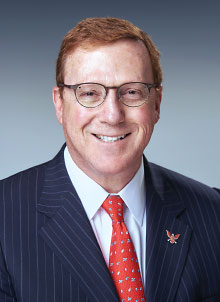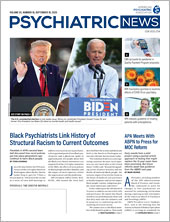Seven young psychiatrists have received small mentored grants from the APA Foundation (APAF) to study the effect of COVID-19 on patients with mental and/or substance use disorders, the psychiatric workforce, and psychiatric practice.
All of the grantees are APA/APAF Fellows. They are Michael Mensah, M.D., M.P.H., APA’s resident/fellow trustee and a PGY-4 psychiatry resident and co-chief of the residency program at the Semel Institute of Neuroscience of the University of California, Los Angeles; Anees Bahji, M.D., a PGY-6 addiction psychiatry fellow at the University of Calgary; Sebastian Cisneros, M.D., a PGY-5 child and adolescent psychiatry fellow at New York-Presbyterian Hospital; Devin Cromartie, M.D., M.P.H., a PGY-4 trainee at Boston University Medical Center; Juliet Edgcomb, M.D., Ph.D., a PGY-5 child and adolescent psychiatry fellow at the Semel Institute for Neuroscience and Human Behavior at UCLA; Youngjung Kim, M.D., Ph.D., a PGY-4 resident at Columbia University; and Tina Thomas, M.B.B.S., a PGY-4 psychiatry trainee at McGovern Medical Center, University of Texas Health Sciences Center.
Each grantee is receiving up to $15,000 to conduct a research project of his or her own design. According to the terms of the Request for Applications, issued in January by the APAF, research projects should include a diverse sample of patients, health care professionals, or practice types depending on the unit of interest. The fellows’ research activities will be carried out under the supervision and guidance of a mentor at his/her primary institution in collaboration with mentors in the APA Division of Research.
“This initiative will enable APA and the APA Foundation to participate in enhancing the field’s understanding of the impact of COVID-19 in diverse populations,” said APA CEO and Medical Director Saul Levin, M.D., M.P.A. “It will also help in diversifying, sustaining, and strengthening a workforce of clinical investigators in psychiatry. This is an outstanding opportunity for APA and the Foundation to work with some of our most promising young psychiatrists in responding to the public health crisis.”
Levin is also chair of the APAF Board of Directors and a former fellow of what is now the APA/APAF Leadership Fellowship.
In addition to the APA/APAF Leadership Fellowship, the other fellowships are the Child and Adolescent Psychiatry Fellowship, Diversity Leadership Fellowship, Edwin V. Valdiserri Correctional Public Psychiatry Fellowship, Jeanne Spurlock Congressional Fellowship, Public Psychiatry Fellowship, SAMHSA Minority Fellowship, SAMHSA Substance Abuse Minority Fellowship, and Psychiatric Research Fellowship.
APA/APAF fellowships provide psychiatry residents the experiential learning, training, mentorship, and professional development they need to be leaders in the field of psychiatry and psychiatric research. The fellowships offer such opportunities as working with Congress on health policy, conducting research, expanding services to minority and underserved populations, and focusing on child psychiatry or substance use disorders. Additionally, APA/APAF fellows get exclusive opportunities to serve on APA councils and network with APA members from around the country.
“A cornerstone of the APAF’s mission is to support research that improves mental health care and contributes to public health,” said Amy Porfiri, M.B.A., interim executive director of the APAF. “We are pleased to be a part of this effort with the APA Division of Research, and we look forward to seeing what these young researchers will accomplish.” ■
Information about the APAF and the APA/APAF fellowships is posted
here.

